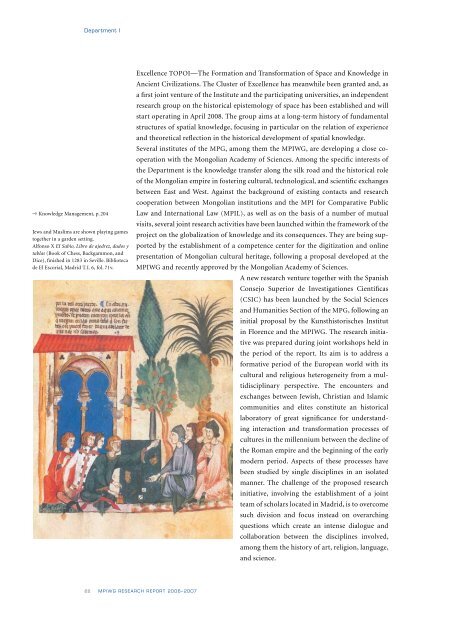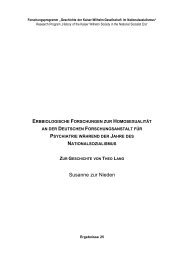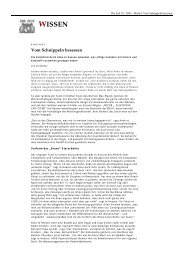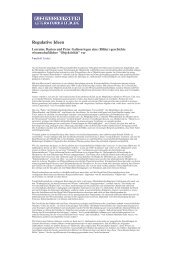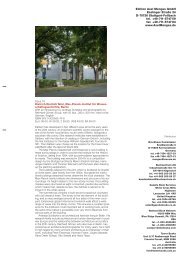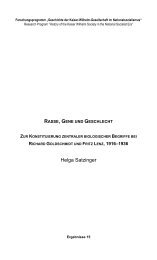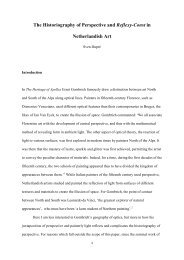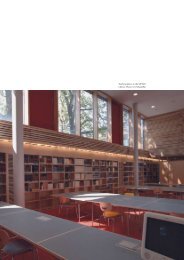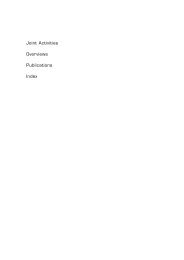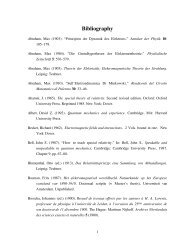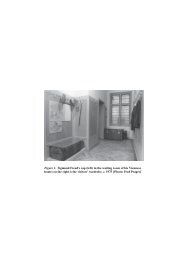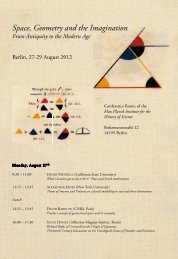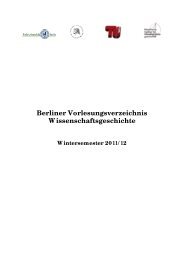Max Planck Institute for the History of Science
Max Planck Institute for the History of Science
Max Planck Institute for the History of Science
Create successful ePaper yourself
Turn your PDF publications into a flip-book with our unique Google optimized e-Paper software.
Department I<br />
➔ Knowledge Management, p. 204<br />
Jews and Muslims are shown playing games<br />
toge<strong>the</strong>r in a garden setting.<br />
Alfonso X EI Sabio, Libro de ajedrez, dados y<br />
tablas (Book <strong>of</strong> Chess, Backgammon, and<br />
Dice), finished in 1283 in Seville. Biblioteca<br />
de El Escorial, Madrid T.I. 6, fol. 71v.<br />
Excellence TOPOI—The Formation and Trans<strong>for</strong>mation <strong>of</strong> Space and Knowledge in<br />
Ancient Civilizations. The Cluster <strong>of</strong> Excellence has meanwhile been granted and, as<br />
a first joint venture <strong>of</strong> <strong>the</strong> <strong>Institute</strong> and <strong>the</strong> participating universities, an independent<br />
research group on <strong>the</strong> historical epistemology <strong>of</strong> space has been established and will<br />
start operating in April 2008. The group aims at a long-term history <strong>of</strong> fundamental<br />
structures <strong>of</strong> spatial knowledge, focusing in particular on <strong>the</strong> relation <strong>of</strong> experience<br />
and <strong>the</strong>oretical reflection in <strong>the</strong> historical development <strong>of</strong> spatial knowledge.<br />
Several institutes <strong>of</strong> <strong>the</strong> MPG, among <strong>the</strong>m <strong>the</strong> MPIWG, are developing a close co-<br />
operation with <strong>the</strong> Mongolian Academy <strong>of</strong> <strong>Science</strong>s. Among <strong>the</strong> specific interests <strong>of</strong><br />
<strong>the</strong> Department is <strong>the</strong> knowledge transfer along <strong>the</strong> silk road and <strong>the</strong> historical role<br />
<strong>of</strong> <strong>the</strong> Mongolian empire in fostering cultural, technological, and scientific exchanges<br />
between East and West. Against <strong>the</strong> background <strong>of</strong> existing contacts and research<br />
cooperation between Mongolian institutions and <strong>the</strong> MPI <strong>for</strong> Comparative Public<br />
Law and International Law (MPIL), as well as on <strong>the</strong> basis <strong>of</strong> a number <strong>of</strong> mutual<br />
visits, several joint research activities have been launched within <strong>the</strong> framework <strong>of</strong> <strong>the</strong><br />
project on <strong>the</strong> globalization <strong>of</strong> knowledge and its consequences. They are being supported<br />
by <strong>the</strong> establishment <strong>of</strong> a competence center <strong>for</strong> <strong>the</strong> digitization and online<br />
presentation <strong>of</strong> Mongolian cultural heritage, following a proposal developed at <strong>the</strong><br />
MPIWG and recently approved by <strong>the</strong> Mongolian Academy <strong>of</strong> <strong>Science</strong>s.<br />
A new research venture toge<strong>the</strong>r with <strong>the</strong> Spanish<br />
Consejo Superior de Investigationes Científicas<br />
(CSIC) has been launched by <strong>the</strong> Social <strong>Science</strong>s<br />
and Humanities Section <strong>of</strong> <strong>the</strong> MPG, following an<br />
initial proposal by <strong>the</strong> Kunsthistorisches Institut<br />
in Florence and <strong>the</strong> MPIWG. The research initiative<br />
was prepared during joint workshops held in<br />
<strong>the</strong> period <strong>of</strong> <strong>the</strong> report. Its aim is to address a<br />
<strong>for</strong>mative period <strong>of</strong> <strong>the</strong> European world with its<br />
cultural and religious heterogeneity from a multidisciplinary<br />
perspective. The encounters and<br />
exchanges between Jewish, Christian and Islamic<br />
communities and elites constitute an historical<br />
laboratory <strong>of</strong> great significance <strong>for</strong> understanding<br />
interaction and trans<strong>for</strong>mation processes <strong>of</strong><br />
cultures in <strong>the</strong> millennium between <strong>the</strong> decline <strong>of</strong><br />
<strong>the</strong> Roman empire and <strong>the</strong> beginning <strong>of</strong> <strong>the</strong> early<br />
modern period. Aspects <strong>of</strong> <strong>the</strong>se processes have<br />
been studied by single disciplines in an isolated<br />
manner. The challenge <strong>of</strong> <strong>the</strong> proposed research<br />
initiative, involving <strong>the</strong> establishment <strong>of</strong> a joint<br />
team <strong>of</strong> scholars located in Madrid, is to overcome<br />
such division and focus instead on overarching<br />
questions which create an intense dialogue and<br />
collaboration between <strong>the</strong> disciplines involved,<br />
among <strong>the</strong>m <strong>the</strong> history <strong>of</strong> art, religion, language,<br />
and science.<br />
22 MPIWG ReseaRch RePoRt 2006– 2007


